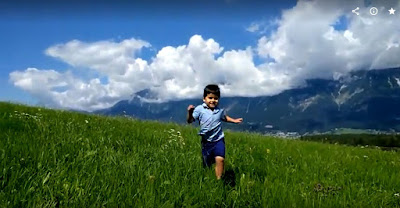A man in lederhosen (leather shorts) strolled through the arrivals hall of Munich's glimmering airport.
He was not a tour guide.
He was not on a stag do.
I've seen Peruvian women in bowler hats in Andean fields, American Indians in blue dresses in supermarkets and Indonesian monks in orange robes on mopeds.
But the 70-year-old Bavarian man in Munich was the first European I'd ever seen wearing traditional dress not for a special occasion - but as part of day-to-day life.
Despite appearing impractically hot and of little use apart from for filming a YMCA music video, the leather loin gear was once worn across much of the Alps.
FAIRYTALES AND...SURFERS?
We also spotted Robin Hood-style trilby hats with feathers.
That was appropriate, as we were in the land of fairytales (Brothers Grimm, publishers of Cinderella, Snow White and Hansel & Gretel were from Bavaria), as demonstrated by a trip to a kids' fairytale theme park (the talking tree had Leo entranced).
Munich's strong regional identity feels different from the rest of Germany – and that's as Bavaria ('Bayern') was its own kingdom for 700 years, until Prussia united in 1871.
We got up-to-date using electric scooters to visit surfers - yes, surfers – on a river in mega English garden park, complete with conker trees.
SHANDY SURPRISE
Bavarians like drinking. A lot.
I felt tough ordering a one-litre stein of 'Hell' lager in the world's second-biggest beer garden, the 6,000-capacity Augustiner Keller, so big staff drive a small lorry to collect glasses.
But a revelation is that most people in Munich's beer gardens don't want to get drunk.
How do I know this? The biggest queue is always for 'Radler,' a 2% beer and lemonade shandy.
So how terrifying was my stein of 'Hell'? The word actually just means pale beer.
I ordered a bratwurst and a lonely sausage was placed on my plate. Do you have any bread, please? No, we don't serve bread.
That must be an American invention then.
Giant dollops of sauerkraut yellow cabbage and sweet red cabbage were my side dishes.
And that really is what we saw the locals eat.
My preconception of Munich's beer gardens was based on London's Winter Wonderland festival beer hall, a feelgood singalong and dancefest of Take Me Home (West Virginia), Summer of 69 and 90s EuroDance.
But it's only Oktoberfest (originally a celebration of a Bavarian king's wedding) which has the singalong.
Munich's beer halls and gardens rarely have live music.
MUSIC, BUT A DARK PAST
We did finally find a brass band to bob along to in Hofbrauhaus, the world's most famous beer hall, which I very uncomfortably discovered later hosted the first meeting of the Nazi party.
Munich shamefully was the home of Nazism as Hitler exploited the economic crisis after harsh World War I Versailles settlements, and Germany's widely-held belief it had been unlucky and should have won WW I.
Hitler sold postcards to tourists in Munich before becoming the most evil man in history, building the first concentration camp and main SS training centre at nearby Dachau, beginning the Holocaust and its 11 million victims.
Tour agencies even offer tours of Hitler's Munich. I was utterly appalled at the idea.
So, from the country that started World War II, to the one that started World War I.
GIGANTIC VIEWS, GOULASH & GELATO
I felt like I was on the front of an Alpen box as, as cow bells chimed, I munched muesli on a village house's terrace, facing Innsbruck's 2,000-metre high Alpine wall.
Well, Austria is the home of My Muesli, a shop boasting 100 varieties and even mix-your-own.
Some of the village's magnificent flower-decked, double-balconied, wooden-fronted giant homes even had painted murals on their walls
Leo picked apricots and blackberries. Grapes even grow at 1,200m altitude, despite being snow-covered for four months of winter.
The most surprising crop, however, is sweetcorn, with field after field of it.
Stunning narrow streets in old towns nod to long-gone times.
Austria was one of Europe's largest powers through medieval times, as rich rulers paid Mozart, Beethoven and Strauss to base themselves in Vienna.
It inadvertently started World War I in an attempt to hang onto its Balkan states and territories. Austria lost and its land was stripped (Tirol, where we stayed, is now two-thirds in Italy).
But it wasn't all Heidi, yodelling and thigh-slapping.
We shovelled in fluffy calzone pizza in a swish restaurant overlooking the lake in which Leo then swam by himself for the first time.
For Leo, the lake also had the 200m-long best children's playground I'd ever seen. For Nati, it had lush creamy gelato. For me, it had beach volleyball courts (yay!...I mean yah!).
We spotted camels in the Alps – but that was at the circus.
Even my German was improving. Some words are the same as English e.g. garten, haus. Some are like French. Some are like Chinese.
Candidates for my favourite moment of the trip include managing three bowls of goulash in one sitting, and, the same day, four gelatos.
But sitting with Leo at the top of the first Alpine hill he climbed, as he picked purple, yellow and white wildflowers as church bells peeled from three villages...now that really was magical – like one of those fairytales.



No comments:
Post a Comment